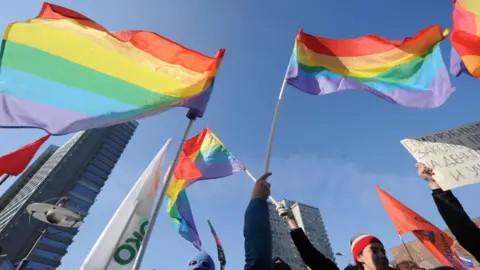Russian parliament bans gender reassignment surgery for trans people
 Getty Images
Getty ImagesRussia's lower house of parliament has passed a new law banning gender reassignment surgery, in the latest attack on LGBT rights in the country.
The State Duma approved the bill, which will also ban people changing their genders on state documents, on Friday.
It now needs approval from the upper house and President Vladimir Putin, moves normally seen as formalities.
Speaker of the Duma, Vyacheslav Volodin, said the bill would "protect our citizens and our children".
In a telegram post on Friday, Mr Volodin also called gender-affirming surgery a "path to the degeneration of the nation".
"We are the only European country that opposes all that is happening in the States, in Europe and does everything to save families and traditional values," he said during the debate on Friday. "And we need to understand that there won't be any future if we don't adopt the law, if we don't ban gender change."
Fresh amendments added to the bill on Friday during its final reading included banning individuals who have undergone gender changes from adopting children, and annulling marriages where one party had undergone gender reassignment.
LGBT rights groups said the legislation would have a serious impact on the health of people denied access to care.
"I think this is an absolutely fascist law, which deprives people of medical care and any basic human rights," said Yan Dvorkin, head of the Center T organisation which provides support for Russian transgender people.
"It is very difficult psychologically for people to be worrying that the government might designate you as an enemy of the people and deprive you of rights, deprive you of any assistance, and leaves you in a lawless state."
Kremlin spokesperson Dmitry Peskov sought to dismiss the concerns, telling reports in Moscow that some of the issues raised by activists against the bill were "perhaps excessive".
But Yulia Alyoshina, Russia's only openly trans politician, accused the government of trying to "repress this small group, which is already discriminated against and stigmatised".
According to the Russian interior ministry, 2,990 people legally changed gender between 2016 and 2022. The country has a population of 146 million.
The law marks a further rolling back of civil rights in Russia, following the passage of last year's anti-LGBT propaganda laws.
Under the legislation, any public expression or portrayal of LGBT culture was outlawed in public spaces. Individuals can be fined up to 400,000 roubles (£5,400) and organisations 5m roubles (£68,500) for "propagandising non-traditional sexual relations".
In recent years the Russia has seen the Orthodox Church and the state enter into an increasingly powerful alliance, with the government pushing the church's conservative social outlook.
President Putin himself has said LGBT lifestyles run counter to traditional Russian values and he has repeatedly railed against trans rights.
The latest attack comes just a day after Russia's internal security service, the FSB, announced that it had arrested a transgender rights activist on charges of treason for supporting Ukraine.
In footage carried by the state-run RIA Novosti news agency, the man was seen being slammed into a wall by armed officers clad in tactical gear, before being driven away in a van.
The agency alleged he had donated to OVD-info, a human rights monitoring organisation banned in Russian in 2021 under its foreign agents laws.
